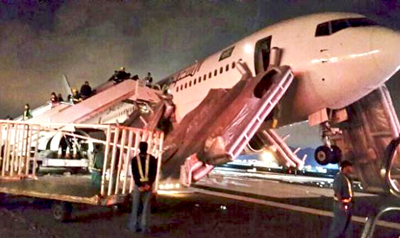 Jeddah, Jan 8: Civil Aviation authorities cancelled 120 domestic and international flights to and from Prince Mohammed Airport in Madinah following the crash-landing of a leased Saudi Arabian Airlines (Saudia) aircraft on Sunday.
Jeddah, Jan 8: Civil Aviation authorities cancelled 120 domestic and international flights to and from Prince Mohammed Airport in Madinah following the crash-landing of a leased Saudi Arabian Airlines (Saudia) aircraft on Sunday.
Many passengers had rerouted their flights to King Abdulaziz International Airport in Jeddah to avoid waiting 24 hours at Madinah airport to get connections to their destinations, informed sources said.
A senior official at Saudia, who requested anonymity, said the airline had asked the General Authority of Civil Aviation (GACA) many times to build a new runway at the airport to avoid the suspension of flights during emergency situations.
“Global aviation standards insist that an international airport should have more than one runway to use during emergencies,” the official said, adding that GACA had not responded positively to the airline’s request.
Madinah has received huge numbers of daily flights after the government upgraded the airport into an international facility, the official said.
Atef Tasji, public relations manager at the airport, confirmed that about 120 domestic and international flights were canceled after GACA decided to suspend flights to the airport following the incident. Informed sources said flights resumed after 36 hours on Monday evening.
Twenty-nine passengers were injured when SV2841 flight carrying 315 passengers and 16 crew members crash-landed in Madinah, on route from the Iranian city of Mashhad. Only three injured people are still in hospital. One of them is a woman who is in intensive care, while the other two are stable.
Meanwhile, Saudia provided a free limousine service to many passengers to catch their onward flights from Jeddah airport. Yasser Farook, an Egyptian, said: “I had booked a flight from Madinah to Cairo on Sunday.
A Saudia official told me I could either wait at the airport or catch another flight from Jeddah airport to Cairo. He then arranged a limousine for me to Jeddah. It was really wonderful.”





Comments
Add new comment